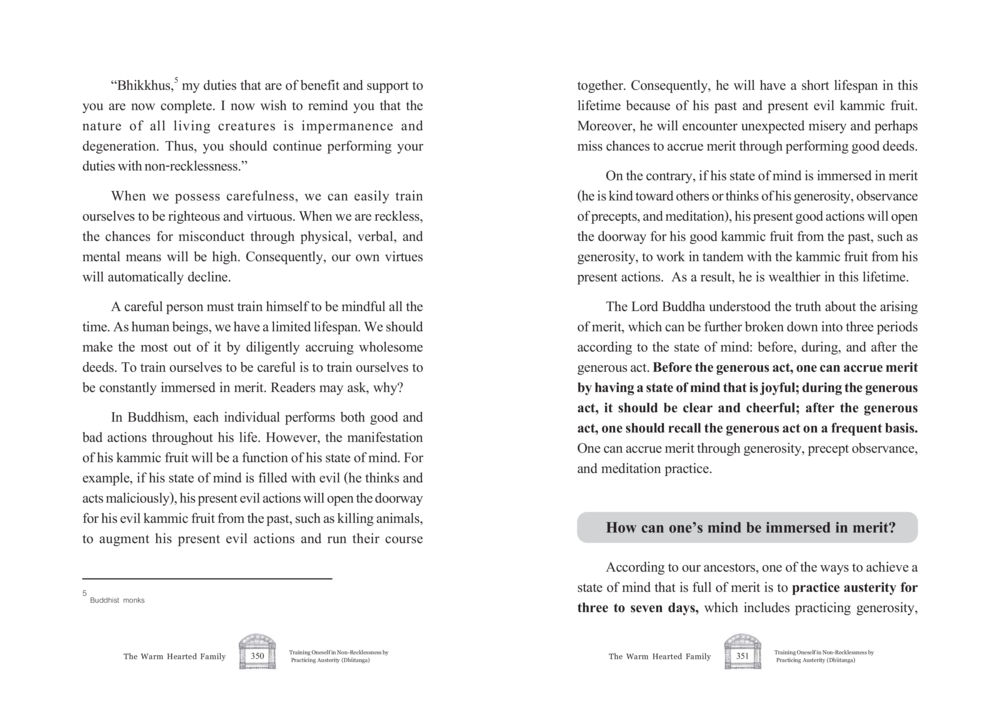The Importance of Carefulness in Buddhism : หน้า 176/207
The Warm Hearted Family : หน้า 176/207 A reflection on the significance of carefulness in performing duties, virtuous actions, and mindfulness in Buddhism.
0 ครั้ง

สรุปเนื้อหา
In this discourse, it is emphasized that impermanence is a fundamental nature of all living beings. To be mindful and careful is paramount in avoiding recklessness, which can lead to misconduct. By diligently accruing wholesome deeds and immersing oneself in merit, one can cultivate virtue. The correlation between one's state of mind and kammic fruit is highlighted, stressing that a positive mindset fosters good actions and mitigates past negative karma. This training in carefulness is essential for maximizing our limited lifespan and promoting righteousness. For more insights on this topic, visit dmc.tv.
หัวข้อประเด็น
-Impermanence
-Mindfulness
-Virtue
-Kammic Fruit
-Recklessness
-Buddhist Teachings
ข้อความต้นฉบับในหน้า
"Bhikkhus,5 my duties that are of benefit and support to you are now complete. I now wish to remind you that the nature of all living creatures is impermanence and degenerat.ion. Thus, you should continue performing your duties with non-recklessness."
When we possess carefulness, we can easily train ourselves to be righteous and virtuous. When we are reckless, the chances for misconduct through physical, verbal, and mental means will be high. Consequently, our own virtues will automatically decline.
A careful person must train himself to be mindful all the time. As human beings, we have a limited lifespan. We should make the most out of it by diligently accruing wholesome deeds. To train ourselves to be careful is to train ourselves to be constantly immersed in merit. Readers may ask, why?
In Buddhism, each individual performs both good and bad actions throughout his life. However, the manifestation of his kammic fruit will be a function of his state of mind. For example, if his state of mind is filled with evil (he thinks and acts maliciously), his present evil actions will open the doorway for his evil kammic fruit from the past, such as killing animals, to augment his present evil actions and run their course."
5 Buddhists monks
หน้าหนังสือทั้งหมด

1

2

3

4

5

6

7

8

9

10

11

12

13

14

15

16

17

18

19

20

21

22

23

24

25

26

27

28

29

30

31

32

33

34

35

36

37

38

39

40

41

42

43

44

45

46

47

48

49

50

51

52

53

54

55

56

57

58

59

60

61

62

63

64

65

66

67

68

69

70

71

72

73

74

75

76

77

78

79

80

81

82

83

84

85

86

87

88

89

90

91

92

93

94

95

96

97

98

99

100

101

102

103

104

105

106

107

108

109

110

111

112

113

114

115

116

117

118

119

120

121

122

123

124

125

126

127

128

129

130

131

132

133

134

135

136

137

138

139

140

141

142

143

144

145

146

147

148

149

150

151

152

153

154

155

156

157

158

159

160

161

162

163

164

165

166

167

168

169

170

171

172

173

174

175

176

177

178

179

180

181

182

183

184

185

186

187

188

189

190

191

192

193

194

195

196

197

198

199

200

201

202

203

204

205

206

207
หนังสือที่เกี่ยวข้อง
Load More
